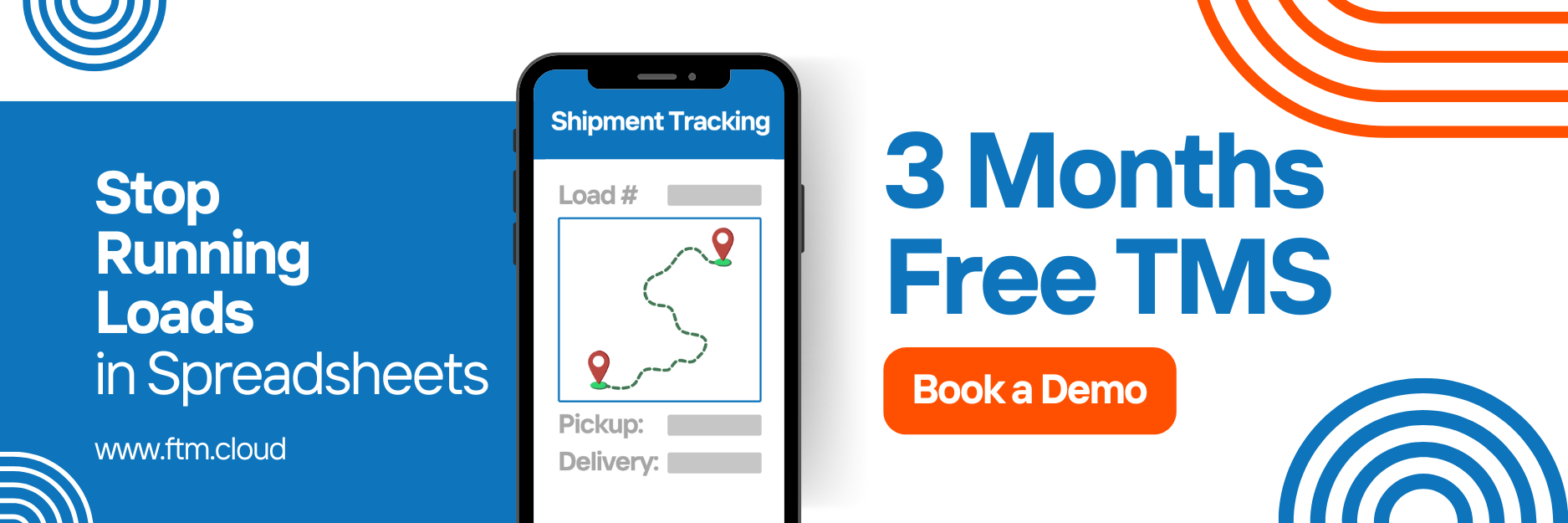Sage Integration Guide
Sync your invoice and customer data directly from Salesforce to Sage.
This integration ensures accounting accuracy by seamlessly pushing relevant invoice data, customer records, and revenue recognition dates from your TMS to Sage.
Overview
The Sage Integration connects FTM’s Transportation Management System (TMS) directly to Sage Intacct for seamless synchronization of invoices, customers, and item data.
This integration ensures financial accuracy by automatically pushing invoice data, customer records, and revenue details from Salesforce to Sage.
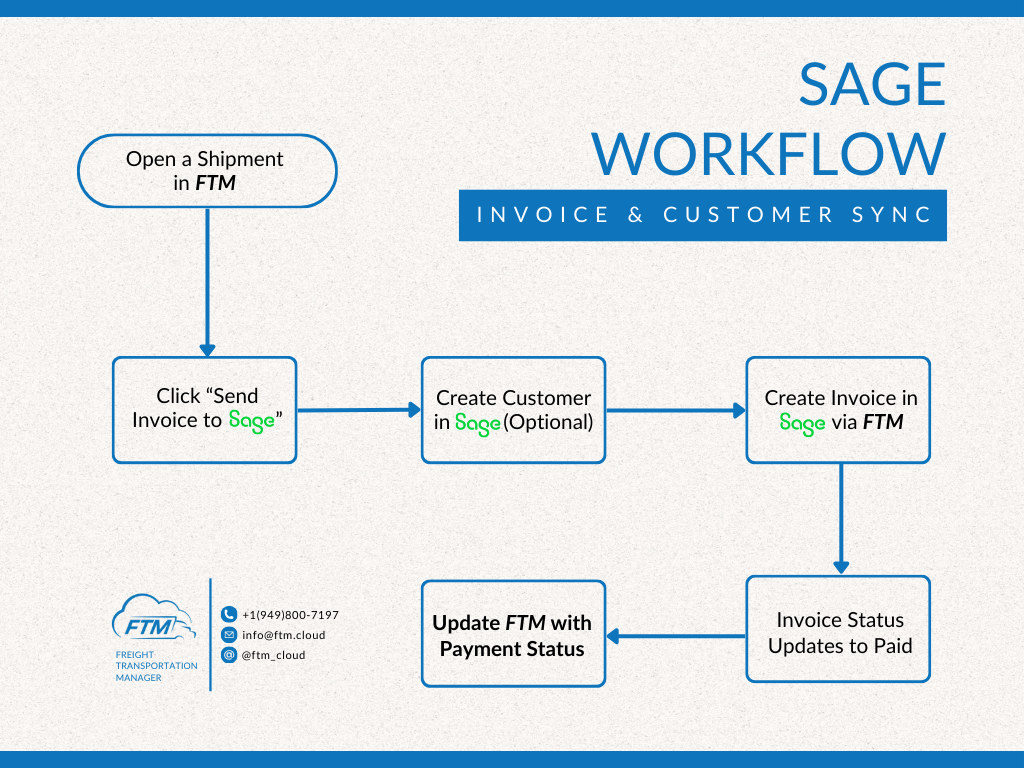
1️⃣ User Information – What This Integration Does
Purpose
This integration automates the invoicing and customer sync process between FTM and Sage Intacct, enabling accounting teams to:
- Push invoices from FTM to Sage Intacct
- Automatically create or update customer records
- Sync item-level billing lines with accurate Sage Item Codes
- Track Sage invoice keys and statuses directly in Salesforce
- Eliminate double data entry between systems
Key Features
✅ One-click invoice push from Salesforce to Sage
✅ Automatic customer and item creation
✅ XML-based secure API communication
✅ Updates FTM records with Sage keys (Customer RecordNo, Invoice Key, etc.)
✅ Visualforce page to view invoice details and trigger Sage actions
Workflow Summary
- Load or Storage record is completed and ready for invoicing
- User opens the “Send Invoice to Sage” Visualforce page
- Click “Create Customer” (if not already synced)
- Click “Create Invoice/Transaction” to push the invoice to Sage
- Success or error messages appear instantly on-screen
- Sage IDs are automatically stored back in FTM fields
Scope & Limitations
⚠️ Important Notes
- The integration supports only Sage Intacct XML Web Services
- Each FTM record must have valid billing addresses and contact details
- Special characters (like & or ‘) in customer names may cause Sage API rejections
- The process requires valid Sage credentials configured in the backend Apex logic
Authentication
The connection uses Sage’s XML Gateway endpoint:
https://api.intacct.com/ia/xml/xmlgw.phtml
Credential Fields (hardcoded in sandbox, customizable via Custom Settings):
- senderid
- senderpassword
- userid
- companyid
- passwordid
Production credentials should be securely stored in Salesforce Custom Settings → Sage.
This prevents hardcoding and allows admin updates without code deployment.
To create custom setting:
Go to setup => Custom setting => Create New => Save

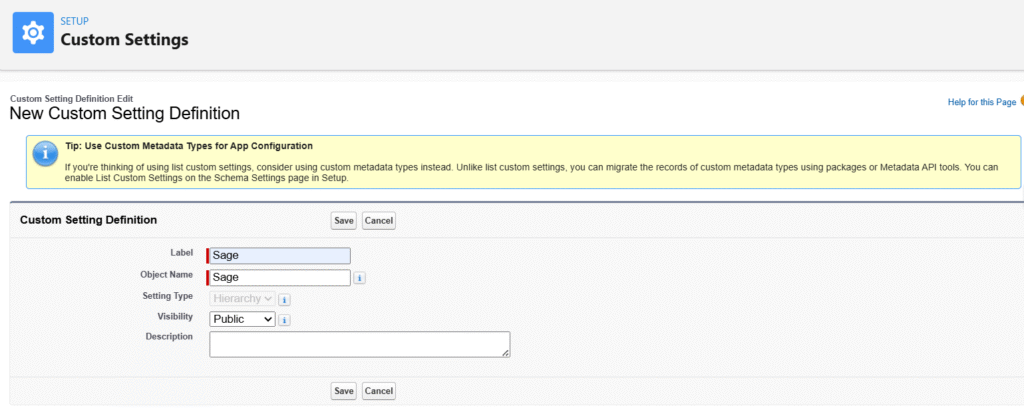
=> In the Custom Field section, create the fields.
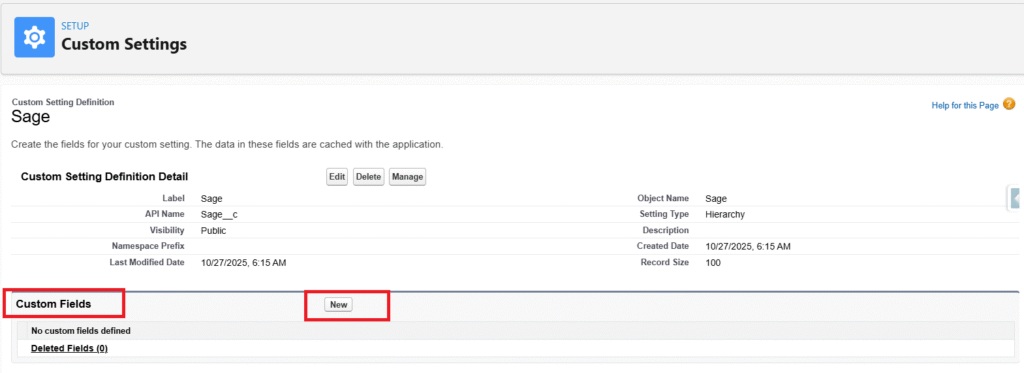
=> Add the value to the fields, and save.
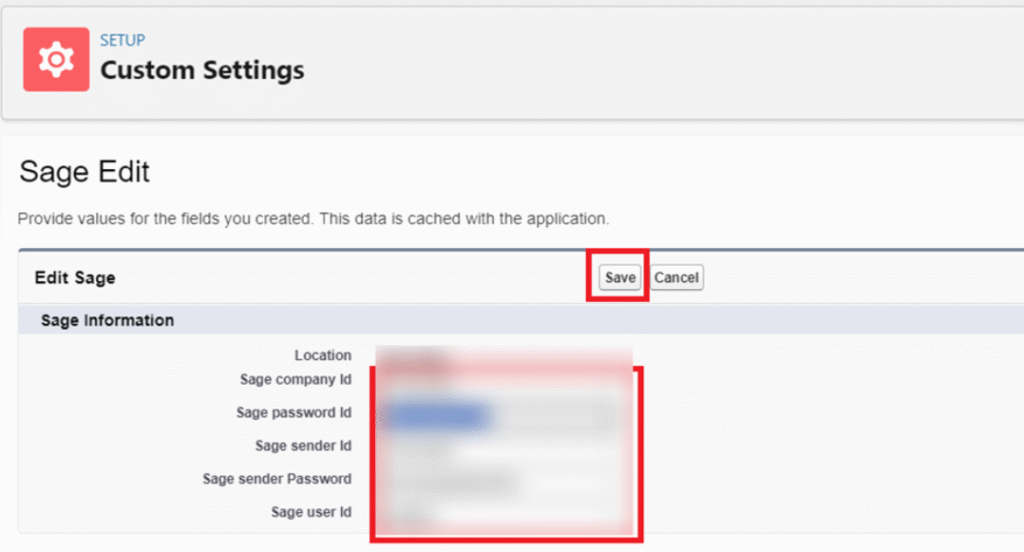
2️⃣ Developer Information – How It Works in Salesforce
Repository
🔗 GitHub: https://github.com/ashkanshamili/FTM
Apex Class
SageInvoice.cls
Handles customer, item, and invoice creation through Sage Intacct’s XML API.
| Method | Purpose |
| CustomerCreate(Id invoiceId) | Creates or updates a customer in Sage using billing data from FreightTM__Storage__c and related Account. |
| InvoiceCreate(Id invoiceId) | Builds and sends invoice XML with line items to Sage, updates record with returned Sage Key. |
| ItemCreate(Id invoiceId) | Pushes related line items as Sage Items, updates Sage Item Record Numbers. |
| CreateCustomer() | Visualforce action method → runs CustomerCreate(). |
| CreateInvoice() | Visualforce action method → runs InvoiceCreate(). |
| CreateItem() | Visualforce action method → runs ItemCreate(). |
Visualforce Page
SageInvoice.page
Provides UI to review invoice data and trigger actions to send data to Sage.
| Button | Action |
| Create Customer | Calls SageInvoice.CustomerCreate() |
| Create Invoice/Transaction | Calls SageInvoice.InvoiceCreate() |
| (Optional) Create Item | Calls SageInvoice.ItemCreate() |
Page Layout Highlights
- Displays invoice number, date, terms, total, and storage details
- Lists all related line items with description, price, quantity, and Sage item type
- Provides success/error messages inline
- Includes a “Back” button to return to previous record
API Endpoint
| Purpose | Method | URL |
| Sage XML Gateway | POST | https://api.intacct.com/ia/xml/xmlgw.phtml |
Core Salesforce Objects
| Object | Usage |
| FreightTM__Storage__c | Invoice record pushed to Sage. |
| FreightTM__Storage_Billing__c | Line items mapped to Sage invoice items. |
| Account | Customer record; updated with Sage Record Numbers. |
XML Request Samples
Create customer
<request>
<control>
<senderid>vinovault</senderid>
<password>VinoVault2023%!</password>
<controlid>test</controlid>
<uniqueid>false</uniqueid>
<dtdversion>3.0</dtdversion>
</control>
<operation>
<authentication>
<login>
<userid>sbaker</userid>
<companyid>vinovault-sandbox</companyid>
<password>V$S@apa!Vino123!!!</password>
</login>
</authentication>
<content>
<function controlid="createCustomer">
<create>
<CUSTOMER>
<CUSTOMERID>12345</CUSTOMERID>
<NAME>ACME Logistics</NAME>
<DISPLAYCONTACT>
<PHONE1>555-1010</PHONE1>
<MAILADDRESS>
<ADDRESS2>123 Main St</ADDRESS2>
<CITY>Dallas</CITY>
<STATE>TX</STATE>
<ZIP>75201</ZIP>
</MAILADDRESS>
</DISPLAYCONTACT>
</CUSTOMER>
</create>
</function>
</content>
</operation>
</request>Create invoice
<create_sotransaction>
<transactiontype>Sales Invoice</transactiontype>
<datecreated>
<year>2025</year><month>10</month><day>27</day>
</datecreated>
<customerid>12345</customerid>
<referenceno>FTM-INV-5678</referenceno>
<termname>Net 30</termname>
<state>TX</state>
<sotransitems>
<sotransitem>
<itemid>1022</itemid>
<itemdesc>Temperature Controlled Transport</itemdesc>
<taxable>true</taxable>
<quantity>5</quantity>
<unit>Each</unit>
<price>300</price>
<locationid>NYW</locationid>
</sotransitem>
</sotransitems>
</create_sotransaction>Response Handling
- XML response parsed via Dom.Document
- Extracts <RECORDNO> and <CUSTOMERID> or <key> for invoices
- Updates Salesforce fields automatically:
- Sage_Customer_ID__c
- Sage_Customer_RecordNo__c
- Sage_Invoice_Key__c
- Status__c → “Sent” or “Invoice Sent”
Error Management
| Scenario | Behavior |
| API failure (non-200) | Displays generic error message in Visualforce page |
| Sage XML “failure” node | Extracts <description> and <description2> text and shows detailed message |
| Missing required field | Customer or invoice creation halted, message displayed |
| Item sync failure | Continues remaining items, logs failed item details |
Testing
Run in Anonymous Apex:
SageInvoice.CustomerCreate('a0KXXXXXXXXXXXXXXX');
SageInvoice.InvoiceCreate('a0KXXXXXXXXXXXXXXX');Or directly via the Visualforce page:
/apex/SageInvoice?id=a0KXXXXXXXXXXXXXXX
Deployment Notes
- Sandbox uses vinovault-sandbox company ID
- Production will use your live Sage company credentials
- Move credentials to Custom Setting: Sage before deployment
- Ensure Remote Site Settings include https://api.intacct.com
- Include test coverage for all three flows (Customer, Item, Invoice)
UI Summary
Buttons
- 🧾 Create Customer → Creates or updates Sage customer
- 💰 Create Invoice/Transaction → Pushes invoice and line items
- 📦 (Optional) Create Item → Syncs Sage Item records
Visual Output
- Invoice header details
- Line item breakdown table
- Inline success or failure messages
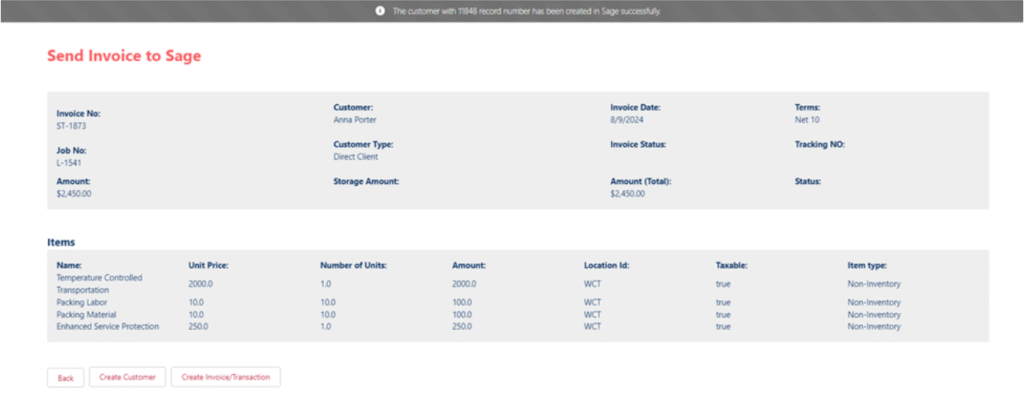

Support Contacts
📧 Integration Support: [email protected]
